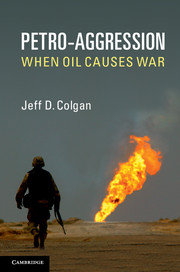Book contents
- Frontmatter
- Contents
- Figures
- Tables
- Acknowledgments
- 1 Introduction
- 2 A theory of oil, revolution, and conflict
- 3 Evidence and research design
- 4 Quantitative impact of oil and revolution on conflict
- 5 Iraq
- 6 Libya and the Arab Jamahiriyya
- 7 Iran
- 8 Venezuela and the Bolivarian Revolution
- 9 Saudi Arabia
- 10 Does oil cause revolution?
- 11 Conclusion and policy implications
- References
- Index
1 - Introduction
Published online by Cambridge University Press: 05 February 2013
- Frontmatter
- Contents
- Figures
- Tables
- Acknowledgments
- 1 Introduction
- 2 A theory of oil, revolution, and conflict
- 3 Evidence and research design
- 4 Quantitative impact of oil and revolution on conflict
- 5 Iraq
- 6 Libya and the Arab Jamahiriyya
- 7 Iran
- 8 Venezuela and the Bolivarian Revolution
- 9 Saudi Arabia
- 10 Does oil cause revolution?
- 11 Conclusion and policy implications
- References
- Index
Summary
Oil is the single most valuable commodity traded on international markets. The total value of its trade is many multiples larger than the trade of any other natural resource, including natural gas, diamonds, timber, or coffee. Not surprisingly, its political effects are pervasive. Oil helps define the relationship between the Persian Gulf countries and the rest of the world. It underlies the “resource curse” in oil-producing states, the symptoms of which include poor economic growth, authoritarianism, and civil war. It is a source of both tension and cooperation between China, India, and the West. It affects the flows of foreign aid. And it shapes military alliances and troop commitments all over the world. As oil supplies become more difficult to access in the future, the relationship between oil and international security is increasingly important.
This book makes the case that global oil consumption is a significant cause of international war. Under certain conditions, oil income enables aggressive leaders to eliminate political constraints, reduce domestic accountability, and take their countries to war. I call this “petro-aggression.” This concept is quite different from the conventional notion of petro-competition: i.e., the idea that states commonly go to war to own “the prize” of oil. Such wars do happen, but they are relatively rare. I argue that petro-competition is only one way in which oil and international security are linked, and it is probably not the most important link. Petro-aggression is a big part of what makes oil so dangerous for world politics.
- Type
- Chapter
- Information
- Petro-AggressionWhen Oil Causes War, pp. 1 - 15Publisher: Cambridge University PressPrint publication year: 2013

